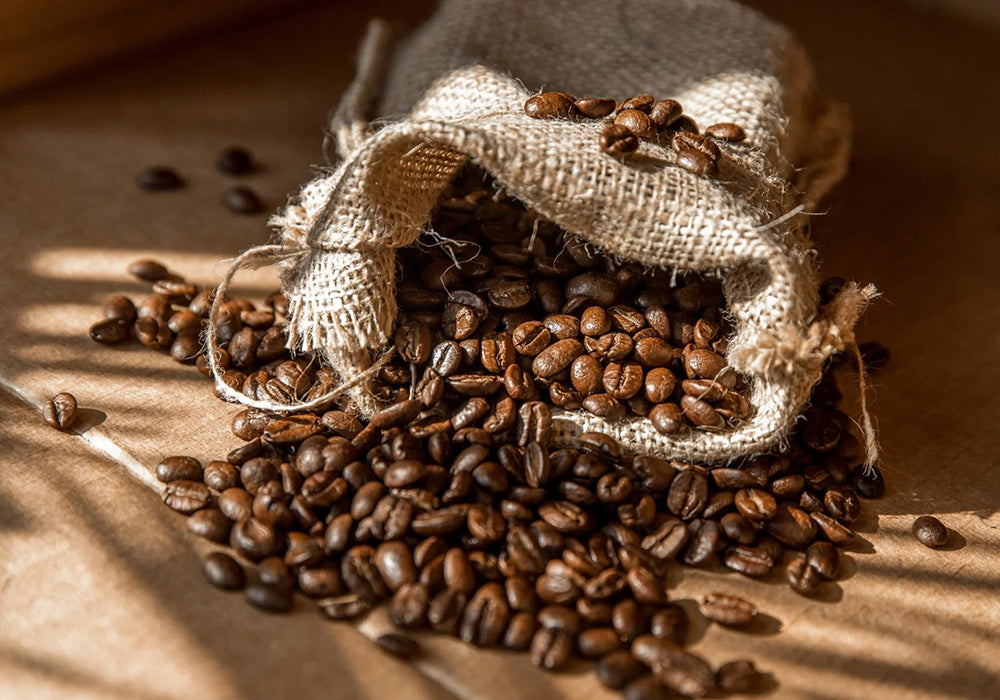The Components of Coffee and Their Effect
Die morgendliche Tasse Kaffee gehört für die meisten von uns einfach zum Tagesprogramm. Nur wenige machen sich darüber Gedanken, was genau in dem beliebten Wachmacher enthalten ist und wie diese Inhaltsstoffe auf unseren Körper wirken. Wir wissen, dass der Cappuccino uns morgens hilft, richtig wach zu werden und beim Nachmittagstief im Büro die Konzentration zu verbessern. Aber was kann Kaffee noch?
Wir wollen uns die Inhaltsstoffe der magischen Bohne und ihre Wirkungen genauer ansehen, damit du weißt, was du trinkst!
Welche Inhaltsstoffe sind im Kaffee enthalten?
Kaffee enthält über 1000 aktive Verbindungen wie Koffein, Chlorogensäure und Trigonellin, die Körper und Geist positiv beeinflussen können. Die extrahierten Wirkstoffe fördern Konzentration, schützen die Leber und tragen zur allgemeinen Gesundheit bei.
Mehr erfahrenGesunde und ungesunde Inhaltsstoffe im Kaffee
Je nach Zubereitungsart verändert sich nicht nur das Aroma, sondern auch die Zusammensetzung der Kaffee-Inhaltsstoffe. Faktoren wie Temperatur und pH-Wert beeinflussen, wie viele Bitterstoffe oder wie viel Koffein in der Tasse landen.
Mehr erfahrenMögliche Auswirkungen des Kaffeekonsums auf den Körper
Kaffee wirkt individuell – er kann die Konzentration fördern und die Stimmung heben, aber auch Blutdruck und Kreislauf beeinflussen. Entscheidend ist die Menge und wie dein Körper darauf reagiert.
Mehr erfahrenWelche Inhaltsstoffe sind im Kaffee enthalten?
Die wichtigsten Inhaltsstoffe sind: Kohlenhydrate, Fettstoffe, Wasser, Eiweißstoffe, Säuren, Alkaloide (Koffein), Mineralstoffe und Aromastoffe. Während die enthaltenen Nährstoffe aus ernährungsphysiologischer Sicht zu vernachlässigen sind, da diese beim Aufbrühen des Kaffeepulvers nicht mit in die Tasse wandern, sind die vielen aktiven Stoffe, die aus dem Pulver extrahiert werden, durchaus einen näheren Blick wert.
Wusstest du etwa, dass das aromatische Heißgetränk mehr als 1000 chemische Verbindungen enthält? Viele davon sind Aroma- und Geschmacksstoffe. Andere wirken sich direkt auf unseren Körper aus; wie Koffein, Chlorogensäure, Trigonellin und Cafestol.
Jeder dieser Inhaltsstoffe hat eine einzigartige Wirkung auf deinen Körper. Koffein, zum Beispiel, ist ein Stimulans, das dich wach hält und deine Konzentration verbessert. Chlorogensäure ist ein Inhaltsstoff, der verschiedene Wirkungen auf den Körper hat. Sie hat antioxidative, blutdrucksenkende, blutverdünnende, leberschützende und zuckerregulierende Eigenschaften, kann aber auch für Magenreizung verantwortlich sein. Trigonellin kann helfen, deine Zähne gesund zu halten, und Cafestol kann deine Leberfunktion verbessern.
Es ist wichtig zu beachten, dass die Wirkung dieser Inhaltsstoffe von Person zu Person unterschiedlich sein kann und auch davon abhängt, wie du deinen Kaffee trinkst. Aber insgesamt hat er viele positive Auswirkungen auf deinen Körper und Geist.
Kaffee ist mehr als Koffein
Wenn wir über Kaffee sprechen, denken wir oft nur an das Koffein, das uns morgens auf die Beine bringt. Aber die vielen Inhaltsstoffe haben alle ihre eigene Wirkung.
Mineralstoffe
Wusstest du, dass das schwarze Gold auch Mineralstoffe enthält, wie etwa Kalium und Magnesium, die wichtig für die Muskel- und Nervenfunktion sind?Auch Kaffee und Eisen werden häufig in einem Atemzug genannt, obwohl der Eisengehalt zu gering ist, um als bedeutsame Eisenquelle zu dienen. Andere Nahrungsquellen wie Fleisch, Fisch, Hülsenfrüchte und grünes Blattgemüse enthalten viel höhere Eisenmengen und sollten daher als Eisenquelle bevorzugt werden.
Kaffeesäuren
Kaffee enthält eine Reihe verschiedener Säuren, unter anderem sind das Chlorogensäure, Apfelsäure, Zitronensäure und Essigsäure. Die Säuren sind ein natürlicher Bestandteil von Kaffee und tragen zum Geschmack des Getränks bei. Sie können jedoch bei einigen Menschen zu Magenbeschwerden, Sodbrennen oder empfindlichen Zähnen führen. Der Säuregehalt in Kaffee kann je nach Sorte, Röstung und Zubereitungsmethode variieren.Es gibt milde Kaffeesorten, die wenig Säure enthalten und daher meist besser verträglich sind.
Öle und Fette
Kaffee enthält Fett in Form von Kaffee-Öl. Der Ölgehalt der Bohnen variiert je nach Sorte, Anbau- und Röstbedingungen. In der Regel haben Arabica-Kaffeebohnen einen höheren Ölgehalt als Robusta-Bohnen und dieser variiert zwischen 10 und 15 %. Dieser Wert bezieht sich jedoch nur auf die Bohne, im fertig gebrühten Getränk ist nahezu kein Fett mehr enthalten.
Antioxidantien
Kaffee enthält eine Reihe von Antioxidantien, die dem Körper helfen, sich gegen freie Radikale zu schützen. Diese wertvollen Verbindungen können helfen, Zellschäden und Entzündungen im Körper zu reduzieren. Chlorogensäure und Polyphenole sind zwei wichtige Antioxidantien im Kaffee, die helfen, freie Radikale zu neutralisieren. Diese instabilen Moleküle können im Körper Schäden verursachen und zu chronischen Erkrankungen führen.

Einfluss der Zubereitung auf die Inhaltsstoffe in der Tasse Kaffee
Wenn du deinen Kaffee zubereitest, hast du sicherlich schon bemerkt, dass sich der Geschmack und das Aroma je nach Zubereitungsmethode unterscheiden kann. Aber wusstest du auch, dass sich selbst die Kaffee-Inhaltsstoffe je nach Zubereitungsart verändern können? Besonders der pH-Wert und die Temperatur haben einen großen Einfluss auf die chemischen Prozesse, die während der Zubereitung stattfinden. So werden bei der Zubereitung von Espresso mehr Bitterstoffe freigesetzt als beim Filterkaffee. Auch die Menge an Koffein kann je nach Zubereitungsart variieren. Wenn du also besonders auf bestimmte Inhaltsstoffe des Kaffees achten willst, solltest du dich vorher über die Auswirkungen der verschiedenen Zubereitungsarten informieren.

Gesunde und ungesunde Inhaltsstoffe im Kaffee
Wie bereits erwähnt, enthält Kaffee etliche Inhaltsstoffe, die sich auf unseren Körper auswirken können. Einige von ihnen sind gesundheitsfördernd, während andere eher negative Auswirkungen haben können. Zu den gesunden Inhaltsstoffen zählen beispielsweise Antioxidantien, die freie Radikale im Körper neutralisieren und somit vor Zellschäden schützen können. Auch Koffein, das stimulierend auf das Nervensystem wirkt, kann in Maßen positive Effekte auf die kognitive Leistungsfähigkeit haben. Allerdings sind im Kaffee auch ungesunde Inhaltsstoffe wie Acrylamid enthalten, das beim Rösten entsteht und im Verdacht steht, krebserregend zu sein. Zudem kann Kaffee bei empfindlichen Personen zu Magenproblemen oder Schlafstörungen führen. Es ist daher wichtig, ihn in Maßen zu genießen und auf eine einwandfreie Qualität zu achten.
Mögliche Auswirkungen des Kaffeekonsums auf den Körper
Wenn es um den Kaffeekonsum geht, gibt es viele Mythen und Vermutungen darüber, wie er sich auf den Körper auswirkt. Einige Menschen behaupten, dass Kaffee dehydriert, während andere sagen, dass er die Verdauung anregt. Aber was ist wirklich dran? Tatsächlich kann Kaffee eine Vielzahl von Auswirkungen auf den Körper haben, je nachdem wie viel man trinkt. Zum Beispiel kann Kaffee den Blutdruck erhöhen und das Herz-Kreislauf-System belasten. Gleichzeitig kann er aber auch die kognitiven Fähigkeiten verbessern und die Stimmung aufhellen. Ob Kaffee gesund ist oder nicht, darüber scheiden sich die Geister. Es ist jedoch erwiesen, dass er viele gesundheitsfördernde Eigenschaften hat, wobei jedoch zu beachten ist, dass jeder Körper anders reagieren kann. Du solltest also auf deinen Körper hören und darauf achten, wie er reagiert.
Welche Kaffeesorten sind gesünder?
Allgemein kann gesagt werden, biologisch angebaute und fair gehandelte Kaffeesorten sind nicht nur die ethnisch bessere Wahl, sondern sind auch besser für unsere Gesundheit. Im biologischen Landbau werden Kaffeebohnen ohne Einsatz von schädlichen Pestiziden und Düngemitteln angebaut, was bedeutet, dass sie weniger chemische Rückstände enthalten. Fair gehandelter Kaffee wird unter Einhaltung ethischer Standards angebaut und gehandelt und ist besser für die Nachhaltigkeit des Kaffeeanbaus. Für Coffee Annan steht nachhaltiger Kaffeeanbau neben der Qualität an erster Stelle. Daher wird Kaffee nicht nur fair gehandelt, sondern die Kaffeeplantagen in den Anbauländern beim nachhaltigen Anbau unterstützt, um das Land über viele Generationen fruchtbar zu halten und für nächste Generationen zu sichern. Für unsere Gesundheit und für unsere Umwelt.
Häufige Fragen zu Kaffee und dessen Inhaltsstoffen
Der Anbau von Kaffee ohne Einsatz von Pestiziden und Düngemitteln ist nicht nur die nachhaltigere Methode, sondern verbessert auch die Qualität und den Geschmack und kann möglicherweise zu höheren Mengen an Mineralstoffen und Antioxidantien führen.
Eine normale Tasse Filterkaffee (236 ml) enthält in der Regel nur 1-2 Kalorien, wenn er ohne Milch, Zucker oder andere Zusätze getrunken wird.
Koffein wirkt stimulierend und kann bei manchen Menschen zu einem erhöhten Herzschlag oder Herzrasen führen. Greife in so einem Fall lieber zu Kaffeesorten mit wenig Koffein oder koffeinfreiem Kaffee.
Fazit
Was kann man daraus schließen? Die Inhaltsstoffe von Kaffee haben alle unterschiedliche Wirkungen auf unseren Körper. Die Wirkungen unseres Lieblingswachmachers ist ganz individuell und hängt von verschiedenen Faktoren wie Alter, Gewicht und Gesundheitszustand ab. Insgesamt ist Kaffee ein komplexes Getränk mit vielen positiven und negativen Auswirkungen auf unseren Körper. Achte beim Kauf auf Qualität, Herkunft und Verarbeitung der Bohnen. Biologisch angebauter Kaffee ist in jedem Fall besser für den Körper und die Umwelt.
Wie bei vielem im Leben gilt auch hier: Genieße Kaffee in Maßen und höre auf deinen Körper, um zu entscheiden, was für dich am besten ist.






